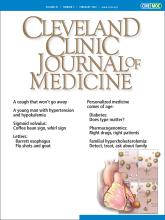
The concept of “precision medicine” includes the ability to prospectively determine how best to provide the right therapy to the right patient to treat the right disease. The goal of providing tailored treatment is not a new concept. It is the cornerstone of all therapies, especially antimicrobial and cancer chemotherapy, where we tailor therapeutic choice on the basis of host and target. What is new is the hope or expectation that we will be able to do this accurately in advance of gathering information from any empiric “n of 1” clinical trial in the individual patient. With our burgeoning understanding of the human genome and ever-advancing understanding of molecular pathophysiology linked to the parallel development of sophisticated molecular tests and targeted therapies, we are developing ways to predict with a degree of precision that was heretofore not attainable in the clinic.
It has been long recognized that some of the heterogeneity of responses to medications in terms of efficacy and side effects is due to genetic influences, even though we have not always been able to identify the exact factors responsible in advance of initiating therapy. Polymorphisms of genes responsible for enzymes, transmembrane transporters, and receptors can dictate interindividual heterogeneity of response to drugs in different ways. Some medications are given as prodrugs requiring enzymatic activation, others are metabolized through specific or competing enzymatic pathways, and yet others require specific transmembrane transporters or receptor binding to mediate their effects. These processes can be influenced by gene polymorphisms, which result in protein products with different functional activities. Molecular techniques allow us to identify these polymorphisms and their different biochemical consequences in advance and to use them prospectively to direct therapeutic choices and dosing— for example, to determine whether to prescribe prednisolone instead of prednisone for a patient with inflammatory disease.
In this issue of the Journal, Hockings et al (page 91) discuss aspects of the growing field of pharmacogenomics, and Hoogwerf (page 100) describes clinical subsets of diabetes mellitus. Both approaches, one molecular and one clinical (supported by biochemical testing), can help predict successful initial therapeutic interventions. These molecular and clinical approaches (supported by specific testing) represent nascent examples of how precision medicine is evolving. But the clinical, genomic, and molecular approaches still have a way to go before they are uniformly accepted and widely applicable.
Further study is needed to understand how frequent a specific gene variant or clinical phenotype and associated event (altered efficacy or side effects) must be in the population to warrant testing. Issues surrounding insurance coverage remain a challenge, but testing is becoming less expensive, and gene-profiling panels will likely soon be routinely available and more affordable. The clinical impact of pharmacogenomic testing, as Hockings et al point out with several examples, has not been uniformly positive and in many situations cannot substitute for routine clinical and laboratory monitoring.
Today, in 2020, we are not yet ready for general genetic screening, but I think we are off to an excellent conceptual start. In some instances, we can identify patients who are at greater or lesser genetic risk for a specific effect of a specific drug. Hockings et al offer examples of when the time is ripe for specific genetic tests; for linking that information to drug databases; and for uniformly incorporating the results into the patient’s health record—just as is currently done for recognized drug allergies. I get an alert if I try to prescribe amoxicillin to a patient with a recorded allergy to penicillin. Someday, I should get an alert if I prescribe prednisone to a patient carrying the genes coding for an inefficient variant of the hepatic enzyme responsible for activating the prodrug prednisone to prednisolone, warning me that I should consider prescribing a higher dose of prednisone, or prescribing the active drug prednisolone.
That day may come soon.
- Copyright © 2020 The Cleveland Clinic Foundation. All Rights Reserved.






